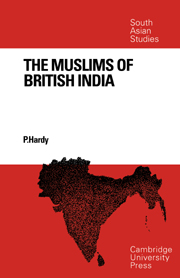Book contents
- Frontmatter
- Contents
- A note on spelling
- Acknowledgements
- 1 Introduction: the medieval legacy
- 2 The effects of British rule on Muslims before 1857
- 3 1857 and its aftermath
- 4 Muslims come to terms with British India as Muslims
- 5 Muslims move towards political community 1871–1901
- 6 Muslims acquire a constitutional identity and enter all-India politics
- 7 Religion enters politics 1910–24
- 8 The period of frustration 1924–35
- 9 The two partitions: of British India and of the Muslim community
- Maps
- A descriptive bibliography of works in European languages
- Glossary
- Index
7 - Religion enters politics 1910–24
Published online by Cambridge University Press: 19 October 2009
- Frontmatter
- Contents
- A note on spelling
- Acknowledgements
- 1 Introduction: the medieval legacy
- 2 The effects of British rule on Muslims before 1857
- 3 1857 and its aftermath
- 4 Muslims come to terms with British India as Muslims
- 5 Muslims move towards political community 1871–1901
- 6 Muslims acquire a constitutional identity and enter all-India politics
- 7 Religion enters politics 1910–24
- 8 The period of frustration 1924–35
- 9 The two partitions: of British India and of the Muslim community
- Maps
- A descriptive bibliography of works in European languages
- Glossary
- Index
Summary
The Muslims who engineered the Simla deputation and who, with eager British assistance, secured separate electorates, were concerned to preserve their quality against the lower orders, a mixed bag of ‘agitators’, for the most part noisy talkative intellectuals and professional men, mainly Hindu, but including some Muslims. Such Muslims did not claim that an assured political identity would serve Islam, or enable Muslims to fulfil more fully the demands of their faith. They accepted that public life in India would continue to run on British lines with purposes – more trains and more drains – agreeable to the contemporary Western ethos. More Indians, it was clear from British pronouncements, were to be co-opted to help their rulers to run India as a westernised dependency and so they, the Muslims of the Simla deputation, wished to be certain of cooption. The possibility of ethical and ideological independence from the West they did not, for all their emphasis on their Muslimness, seriously contemplate. Like comfortable Christians somewhat relieved to be told that real Christianity died with Christ, the founders of the Muslim League were probably somewhat relieved to hear from some ʿulama that the true Islamic state had died with the Caliph ʿAli in 661 – or was it with the Prophet himself in 632? They could busy themselves with regaining, or defending, their status as the ‘natural’ aristocracy of India. Anyway, Sir Saiyid Ahmad Khan had shown that the modern world was ‘islamic’, though some of his arguments were perhaps rather quaint.
- Type
- Chapter
- Information
- The Muslims of British India , pp. 168 - 197Publisher: Cambridge University PressPrint publication year: 1972



